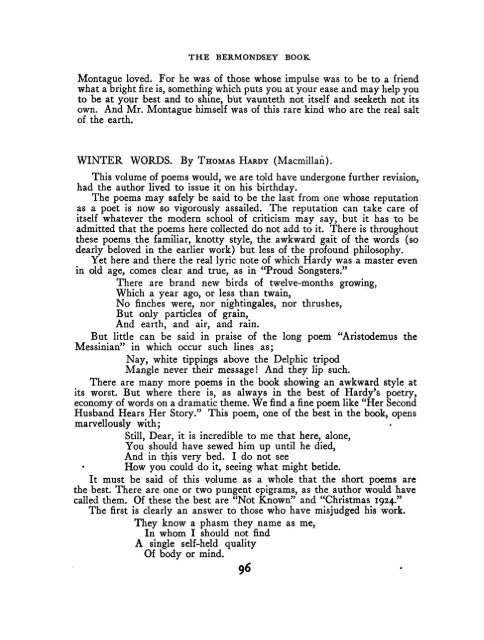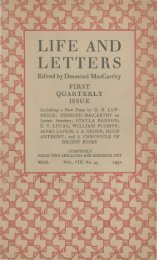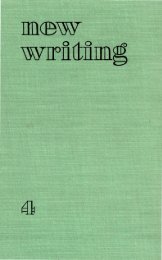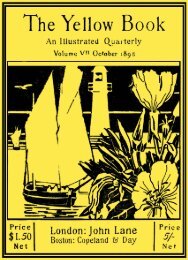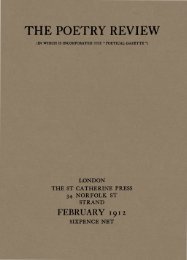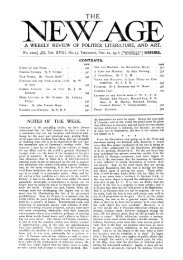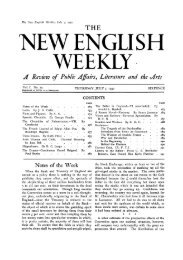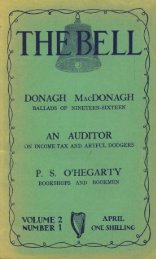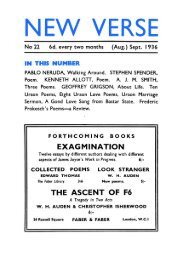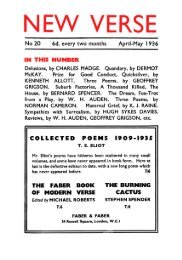Vol. VI No. 1 - Modernist Magazines Project
Vol. VI No. 1 - Modernist Magazines Project
Vol. VI No. 1 - Modernist Magazines Project
You also want an ePaper? Increase the reach of your titles
YUMPU automatically turns print PDFs into web optimized ePapers that Google loves.
THE BERMONDSEY BOOK<br />
Montague loved. For he was of those whose impulse was to be to a friend<br />
what a bright fire is, something which puts you at your ease and may help you<br />
to be at your best and to shine, but vaunteth not itself and seeketh not its<br />
own. And Mr. Montague himself was of this rare kind who are the real salt<br />
of the earth.<br />
WINTER WORDS. By THOMAS HARDY (Macmillan).<br />
This volume of poems would, we are told have undergone further revision,<br />
had the author lived to issue it on his birthday.<br />
The poems may safely be said to be the last from one whose reputation<br />
as a poet is now so vigorously assailed. The reputation can take care of<br />
itself whatever the modern school of criticism may say, but it has to be<br />
admitted that the poems here collected do not add to it. There is throughout<br />
these poems the familiar, knotty style, the awkward gait of the words (so<br />
dearly beloved in the earlier work) but less of the profound philosophy.<br />
Yet here and there the real lyric note of which Hardy was a master even<br />
in old age, comes clear and true, as in "Proud Songsters."<br />
There are brand new birds of twelve-months growing,<br />
Which a year ago, or less than twain,<br />
<strong>No</strong> finches were, nor nightingales, nor thrushes,<br />
But only particles of grain,<br />
And earth, and air, and rain.<br />
But little can be said in praise of the long poem "Aristodemus the<br />
Messinian" in which occur such lines as;<br />
Nay, white tippings above the Delphic tripod<br />
Mangle never their message! And they lip such.<br />
There are many more poems in the book showing an awkward style at<br />
its worst. But where there is, as always in the best of Hardy's poetry,<br />
economy of words on a dramatic theme. We find a fine poem like "Her Second<br />
Husband Hears Her Story." This poem, one of the best in the book, opens<br />
marvellously with;<br />
Still, Dear, it is incredible to me that here, alone,<br />
You should have sewed him up until he died,<br />
And in this very bed. I do not see<br />
How you could do it, seeing what might betide.<br />
It must be said of this volume as a whole that the short poems are<br />
the best. There are one or two pungent epigrams, as the author would have<br />
called them. Of these the best are "<strong>No</strong>t Known" and "Christmas 1924."<br />
The first is clearly an answer to those who have misjudged his work.<br />
They know a phasm they name as me,<br />
In whom I should not find<br />
A single self-held quality<br />
Of body or mind.<br />
96


